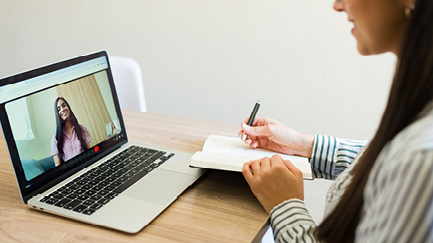
How telehealth can support you
If you’re a veteran or family member looking to access Mates4Mates clinical services but can’t make it to a centre, a telehealth appointment may be the answer.

People thrive when there is certainty in their lives – when there is routine and familiarity. It provides us with a sense of, safety, security and predictability and helps us anticipate and deal with any curve balls that life may throw our way. But this also means that when life does become uncertain, mental health symptoms can develop or be exacerbated.
Sudden changes, including job loss, being discharged from the ADF, difficulty with transition, injury and of course the current COVID-19 pandemic, can create an intense sense of uncertainty on an individual and global level.
What’s the problem with uncertainty?
When we experience the unknown or the unfamiliar, our brains can try and create certainty by overthinking for every possible scenario, in order to cope. That is, if there is an unknown then we can try to fill in the blank with every possible scenario and then problem solve that scenario, which leads to new scenarios that need problem solving.
Does this sound familiar? “What if this happens, then that will happen, and I will need to do this, but if the other thing happens, I will need to do that.” This my friends is rumination, a classic symptom of anxiety. Literally solving for things that have not happened yet. So how do we learn to tolerate uncertainty, especially when it is so anxiety provoking?
Tolerating Uncertainty
The solution is to learn to gradually face uncertainty in daily life by easing back on certainty-seeking behaviours. Uncertainty seeking behaviours can include constantly checking the news, Facebook or other methods to find out the current status of the pandemic. It can look like creating a million and one plans for any outcome that might happen, it can look like panic buying toilet paper, messaging friends continuously, every day. But the aim here is to lessen these behaviours and learn to sit with the unpleasant sensation of uncertainty. And then over time your tolerance to this will improve. Much like any other skill, you need to practice it. But practice it gradually.
Start small: Don’t text your friend immediately the next time you need an answer to a question. Go on a hike without checking the weather beforehand. As you build your tolerance-of-uncertainty muscle, you can work to reduce the number of times a day you consult the internet for updates on the outbreak.
In time, this will lessen your anxiety symptoms and help you ease your way through this situation.
If you’re currently serving, a veteran or a family member, and you would like assistance with managing uncertainty, please call Mates4Mates to make an appointment with one of our psychologists. Alternatively, speak with your GP about finding a psychologist.

If you’re a veteran or family member looking to access Mates4Mates clinical services but can’t make it to a centre, a telehealth appointment may be the answer.